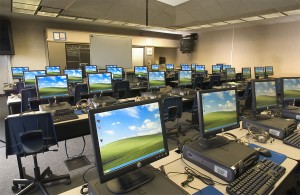curriculum expectations language courses materials personal teaching
by sendaiben
2 comments
End of term/semester
I just finished my grading for this semester. It’s nice to be done with classes, and time to start looking ahead to the next semester.
Here are some changes I’m planning to make:
- Make my computer class more interactive. This semester was my first teaching in a computer lab, and the strange environment threw me. Now that I am more used to it, I am going to try to involve the students more in talking to each other.
- Create a workbook for extensive reading classes (this is a team project). Our extensive reading classes are going really well, but we’re hoping that a bilingual workbook/briefing will make things much smoother at the start and allow teachers to run their classes more easily.
- Start using a new textbook for my presentation classes. I used to use Speaking of Speech New Edition (Harrington and Lebeau) but while useful it is a bit simple and childish for my students. It was a good match when I was starting out teaching presentation, but I think I have outgrown it now. We’ll be using Presentations in English (Williams) instead.
This is my fourth year here, so I have established routines and am fairly comfortable. There is always room to tweak and improve though.
How about you, what are you going to change next time round?
curriculum expectations Language learning self-study speaking teaching teaching culture technology university
by sendaiben
leave a comment
Home Run Lesson
I just finished teaching a home run lesson (strange thing to say, as I am from the UK and don’t even understand how to play baseball) and am now compelled to write about it.
From this semester I have started teaching a class in a computer lab (you can read about the disastrous second lesson here). Today was a very different experience.
We had another tough class last week, where I gave the students too much work to do in too short a time. This week I wanted to give them a break, and put together something a bit lighter.
You can see the full lesson plan on my teaching blog.
This class has been weird for me. Partly it’s because of the physical properties of the computer lab, where students are much further away and more inaccessible than I am used to. Partly it’s the dynamics of the class, where I communicate with the students via blog, notebook comments, and email. And partly it’s because I have never taught this particular course before, so I’m making it up as I go along.
Today we explored a theme that I am very interested in having students think about. Part language identity poll and part wake-up call, the class examines Japanese speakers of English and asks the students to consider where they would fall on a scale ranging from non-English user to native-like speaker.
It seems I got the timing right this week, as the students all finished on time, but what really blew me away were the comments. I’m going to post a few below. The brackets show comments that were in Japanese originally. Translations are mine and may be inaccurate 🙂
Today’s work was good. I think about why we learn English again. I want to train my English skill, especially listening and speaking skill.
(I noticed that my English is really poor. I want to be able to understand spoken English at the very least. I’ll need English once I start working, so I want to get better at it while I am still a student)
Today,my motivation rised. I want to become well to speak English like them.In the future, I would like to interview without an interpreter.
It is good for me to see Japanese-speaker in the various phases.I think I am in no English, especially listening, so I will study English everyday and improve my English skill.
(I was completely shocked. I think I will study English more. Thank you)
It was nice to know a few Japanese who has different English skills. I noticed be able to speak English fluently is pretty hard.
Most students said similar things, which made me incredibly happy. My goal for this class was to get students thinking about why they might be studying English, and motivate them to push a little harder.
Now, this lesson is by no means perfect, and I’m already thinking about how to update and improve it, but I wanted to share it as it went down so well.
Has anyone done anything similar?
curriculum EFL expectations language courses Language learning online resources teaching technology university
by sendaiben
5 comments
Independent study in a computer lab (my steep learning curve starts here!)
I started teaching in a computer lab for the first time this semester. It’s been a bit traumatic so far, as the classroom dynamic changes a lot, but I’m enjoying the challenge so far.
Yesterday we had our first proper class, and I decided to run it as an independent study session to allow students to familiarize themselves with some useful online tools. There were 35 2nd-year non-English majors in the class, and their English ability and familiarity with computers varied wildly. You can see my lesson briefing on my teaching blog here.
The lesson was partly successful, but I can see how to make it better and was very excited by the potential of using a blog or website to communicate with students. Here are my major impressions of the class:
- I tried to do far too much. None of the students had enough time to finish, and that was very harmful to the classroom atmosphere and their feelings towards the course. This is the #1 thing I would change about the lesson
- Only a couple of students asked questions/for help. Need to spend more time getting the class comfortable with calling me over to help with problems
- Unforeseen technical problems reared their ugly heads: the NY Times website does not allow popjisyo to load individual articles (something I only noticed when a student pointed it out) and the edublogs comment feature is a bit too aggressive in its attempts to deter spambots. Both of these caused a lot of frustration to my students
EFL eikaiwa ES extensive reading kids language courses Language learning materials Penguin Kids Readers readers Reading Review reviews school management teaching
by sendaiben
4 comments
Penguin Kids Readers
Resuming our kids’ readers roundup after a brief hiatus 🙂
I received a set of these a couple of weeks ago from the publisher (thanks!). While I appreciate the gesture, it will not affect how I review them here.
Having said that, this is a fantastic new series that has a lot going for it. There are currently 23 readers over six levels of difficulty.
Level 1 (200 headwords)
Level 2 (400 headwords)
Level 3 (600 headwords)
Level 4 (800 headwords)
Level 5 (1000 headwords)
Level 6 (1200 headwords)
As you can see, the jump between levels is fairly minimal, something that is extremely important for beginner and younger readers.
The current titles are all based on Disney films, and the artwork and covers are beautiful. The writing isn’t bad, either, in that the books actually tell coherent stories. That is often a problem with low-level readers based on films or TV content -they try to fit in too much with a minimal wordlist so the stories end up not making sense. Luckily that is not the case here. In many of the books they have taken just one scene from a film and told that. Our students found the books really attractive due to the topics, but there was enough of a spread that they had not seen all of the movies featured.
Another thing I liked were the simple exercises in the back of the books. They have pre-reading and post-reading questions that are visual and fairly easy -perfect to do in class after reading or to check out of class reading. If anything, I would have liked to see this section be slightly longer.
Apparently the series will end up having twelve books at each level, and there will be different content in the next wave of books (ie not just Disney).
Overall, this is a fantastic new resource. We ended up ordering two more sets, and I’m really looking forward to the release of the rest of the books in this series.
curriculum EFL evaluation expectations language courses Language learning teaching testing university
by sendaiben
leave a comment
New (Academic) Year’s Resolutions
Now that we are two three months into 2010 2012 (can you tell when I started writing this post?), it seems like a good time to think about new year resolutions. I didn’t make any specific ones this year, but I would like to make some for the next academic year.
In Japan the academic year runs from April to March, and at universities at least classes finish in February, allowing teachers some much-needed downtime to do admin, write papers, and think about next year’s classes.
So what am I going to focus on next year?
One of my priorities as a teacher and learner is effectiveness, or maximising results. I want to continue making my classes as effective as possible. I define effectiveness as the amount of learning over a certain time.
For my university classes, I am working off the following assumptions:
1. my students have already studied enough grammar
2. we only have a maximum of 22 hours together
3. my students actually want to learn English
4. most of my students don’t know how to get better at English
5. there are things I can teach my students that will help them improve their English
6. tests and quizzes, while very useful for assigning letter grades, are not very helpful
I am going to be teaching the following classes next year:
Reading
Communication
Listening
Presentation
I have already submitted my syllabi and know more or less what we are going to be doing, but I would be very interested to hear any advice or ideas about what I should do in each of these. I’ll be posting the contents later in the week. Please comment below.




